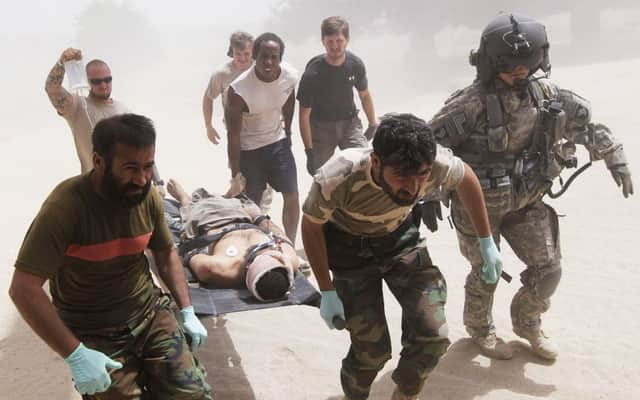Scotland leads the way in healthcare at a distance


With a simple aim to bring people closer to the best medical care possible, technology devised in Scotland has been used to transcend geography and tight health budgets at both home and abroad, even breaking vital healthcare to conflict zones.
A collaboration between Strathclyde, St Andrews and Glasgow universities with London School of Hygiene and Tropical Medicine and NHS Glasgow has led to a major achievement in the treatment of eye diseases in Africa.
Advertisement
Hide AdAdvertisement
Hide AdThe Peek Retinal Adapter is fitted over a standard smartphone and shines a light beam deep into the eye before an image is taken of the retina.
During trials in Kenya on more than 2,000 eyes, the smartphone image was emailed to an eye specialist at Moorfields Eye Hospital in London to give speedy and early diagnosis diseases such as glaucoma, Diabetes retinopathy will be checked for in Tanzania,
Crucially, the technology replaces the need to have a standard desktop retinal camera which costs in the region of £20,000. It is estimated that the adapter will cost just over £100 to buy.
The kit, which is heading into production after a crowdfunder raised more than £130,000, will be used to treat patients in the Western Isles and other hard to reach areas of Scotland, it is hoped.
Nigel Bolster, a research associate of the biomedical engineering department at Strathclyde University who helped devise the adapter, said an eye expert no longer needed to travel to the patient given the image can be taken by anyone who can use a smartphone.
Mr Bolster added: “We can see the Peek Retinal Adapter having implications here in Scotland too. You don’t want to have to send an eye specialise to Shetland, where I am originally from, or the Wester Isles every six months. Anyone can use the technology after half a days training. You don’t have to know what the images means. You just need to be able to use a smartphone.”
Mr Bolster said Scotland had been “quick” to seize the importance of digital health and remote healthcare.
He added: “Scotland was in on the ground level and has a high impact to make in this area. Hopefully the next stage is getting the technology out to hospitals and GPs and making sure the research is turned into something that is used clinically.”
Advertisement
Hide AdAdvertisement
Hide AdThis week, Aberdeen University announced its development of new software which will improve diagnosis of brain injuries amongst soldiers fighting in the field.
Devised in conjunction with the Ministry of Defence’s science and technology laboratory, the software uses ultrasound to create a 3D model of the brain which can be sent by email to a UK specialist for a swift diagnosis. It has been designed so that even an inexperienced medic can take the scan.
In the Highlands, work has been ongoing to create a ‘virtual hospice’ to care for terminally ill patients across the region. It launched in January, with 13 patients now logging on from home to access online Skye consultations, physiotherapy sessions and counselling from specialists at the Highland Hospice in Inverness.
The virtual hospice, created amid an ageing population and a move to treat more people at home, is the first of its kind in the UK and aims to care for 100 patients by the end of the year.
Kenny Steele, chief executive of Highland Hospice, said: “We are developing the model all the time but it is certainly proving successful.
“Our particular angle is how we support people in rural areas but we think the virtual hospice has got as much use in an urban setting. Being ill is isolating whether you are geographically isolated or not. Quite a lot of the time an illness will keep you at home. What we have is a method that allows you to keep in touch.
“It doesn’t matter if you are being cared for in the physical hospital environment or at home. You can request the same sort of guidance.”
Mr Steele said while the complexity of an illness may mean that a hospice or a hospital is the right option, people would generally prefer to stay at home if they were well enough. He added: “I think you have got to be careful that the technology doesn’t remove the human contact. We wouldn’t want to retract that – but we can extend it.”